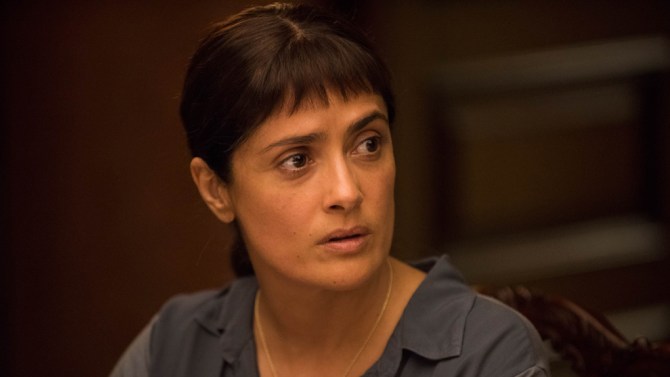
There’s a joke I’ve read on the internet; a tongue-in-cheek suggestion that fans of standalone episodes of serialized television might seek out and, God forbid, enjoy a little something called a feature film. Miguel Arteta’s Beatriz at Dinner could prove to be a bit of a bridge; a perfectly contained and tidy story, digestible and translatable for the small screen. But what makes it most TV-like perhaps is the desire to know more about these characters, their backstories and motives, which aren’t explored in depth. This is not, by any means, to mark Beatriz at Dinner as shallow or second-rate. The script, by Mike White, not unfamiliar with themes of alienation, doggedly and delicately shows what it feels be a person in the world, especially if that person is alone and wounded, slightly awkward, and overwhelmed with wrestling what might be a futile endeavor, existence or Sisyphean task. That the central character of the film here is an immigrant only adds another layer to White’s usual portrayal of marginal and lonely figures.
A dowdied up Salma Hayek plays Beatriz, a new-age health practitioner and Mexican immigrant who finds herself the unexpected guest at a one-percenter dinner party hosted by her long-time client, Cathy (Connie Britton). She invites Beatriz when her car breaks down, not out of charity, but with the flippant warmth of a genteel host, unaware of the social mess to come. White’s signature brand of squeamish social discomfort acclimates perfectly to this intersection of class and race as Beatriz is mistaken for the help, queried about her legal status, and all in all treated like a child (she’s even sent to bed after too much wine). The majority and most politically incorrect remarks so coldly and matter-of-factly spout from a real estate mogul Doug Strutt (John Lithgow, lecherously self-righteous) whose new construction project is the reason for this fete. Arteta’s camera never shies away from the exchanges, allowing us to bask in the glory of white people’s discomforts.
Their reactions vary; Strutt's wife is compensatory, another guest (Chloe Sevigny putting on her Connecticut best) is knowingly decorous, while her husband (Jay Duplass) supplies jejune notes of drunken humor. Beatriz for her part gamely fields the questions and graciously handles quandaries; however, she is not without her own faults. She’s an awkward character from White’s world which means she will chat away and is unaware of boundaries. The new construction business and the CEO's environmental disregard comes to a clash with the values of Beatriz, a self-declared healer and lover of the earth, but also an innate activist, though she'd never label herself as such, like Laura Dern's character did in Enlightened, White's short-lived but spectacular HBO series which dealt with similar themes. Beatriz's shock comes neither from the guests' wealth nor their off-color comments, but the cruelty and callous indifference that so often accompanies them. The rich can afford to live in ignorance, but judgement comes not from Beatriz, instead it's inherent in the script and the fine actors' depictions of what is never innocuous incomprehension or denial, rendering the film all the more effective.

